 Полная версия
Полная версияComic History of the United States
The Americans therefore got a large amount of munitions of war, both here and at Crown Point.
General Washington was now appointed commander-in-chief of all the troops at the second session of the Continental Congress. On his arrival at Boston there were only fourteen thousand men. He took command under the historic elm at Cambridge. He was dressed in a blue broadcloth coat with flaps and revers of same, trimmed with large beautiful buttons. He also wore buff small-clothes, with openings at the sides where pockets are now put in, but at that time given up to space. They were made in such a way as to prevent the naked eye from discovering at once whether he was in advance or retreat. He also wore silk stockings and a cocked hat.
The lines of Dryden starting off "Mark his majestic fabric" were suggested by his appearance and general style. He always dressed well and rode a good horse, but at Valley Forge frosted his feet severely, and could have drawn a pension, "but no," said he, "I can still work at light employment, like being President, and so I will not ask for a pension."
Each soldier had less than nine cartridges, but Washington managed to keep General Gage penned up in Boston, and, as Gage knew very few people there, it was a dull winter for him.
The boys of Boston had built snow hills on the Common, and used to slide down them to the ice below, but the British soldiers tore down their coasting-places and broke up the ice on the pond.
They stood it a long time, rebuilding their playground as often as it was torn down, until the spirit of American freedom could endure it no longer. They then organized a committee consisting of eight boys who were noted for their great philosophical research, and with Charles Sumner Muzzy, the eloquent savant from Milk Street, as chairman, the committee started for General Gage's head-quarters, to confer with him regarding the matter.
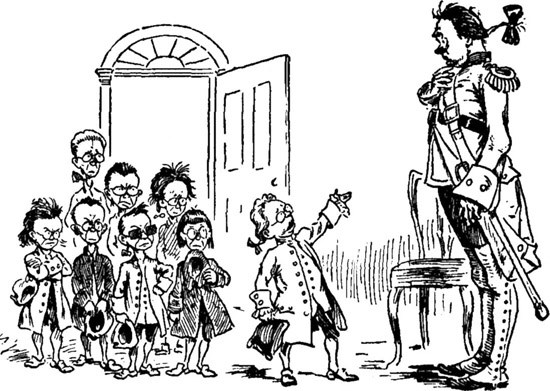
INTELLECTUAL TRIUMPH OF THE YOUTH OF BOSTON OVER GENERAL GAGE.
In the picture Mr. Muzzy is seen addressing General Gage. The boy in the centre with the colored glasses is Marco Bozzaris Cobb, who discovered and first brought into use the idea of putting New Orleans molasses into Boston brown bread. To the left of Mr. Cobb is Mr. Jehoab Nye, who afterwards became the Rev. Jehoab Nye and worked with heart and voice for over eight of the best years of his life against the immorality of the codfish-ball, before he learned of its true relations towards society.
Above and between these two stands Whomsoever J. Opper, who wrote "How to make the Garden Pay" and "What Responsible Person will see that my Grave is kept green?" In the background we see the tall form of Wherewithal G. Lumpy, who introduced the Pompadour hair-cut into Massachusetts and grew up to be a great man with enlarged joints but restricted ideas.
Charles Sumner Muzzy addressed General Gage at some length, somewhat to the surprise of Gage, who admitted in a few well-chosen words that the committee was right, and that if he had his way about it there should be no more trouble.
Charles was followed by Marco Bozzaris Cobb, who spoke briefly of the boon of liberty, closing as follows: "We point with pride, sir, to the love of freedom, which is about the only excitement we have. We love our country, sir, whether we love anything else much or not. The distant wanderer of American birth, sir, pines for his country. 'Oh, give me back,' he goes on to say, 'my own fair land across the bright blue sea, the land of beauty and of worth, the bright land of the free, where tyrant foot hath never trod, nor bigot forged a chain. Oh, would that I were safely back in that bright land again!'"
Mr. Wherewithal G. Lumpy said he had hardly expected to be called upon, and so had not prepared himself, but this occasion forcibly brought to his mind the words also of the poet, "Our country stands," said he, "with outstretched hands appealing to her boys; from them must flow her weal or woe, her anguish or her joys. A ship she rides on human tides which rise and sink anon: each giant wave may prove her grave, or bear her nobly on. The friends of right, with armor bright, a valiant Christian band, through God her aid may yet be made, a blessing to our land."
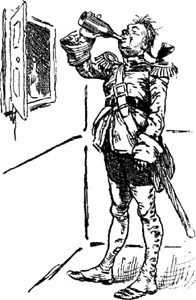
GENERAL GAGE THINKING IT OVER.
General Gage was completely overcome, and asked for a moment to go apart and think it over, which he did, returning with an air which reminded one of "Ten Nights in a Bar-Room."
"You may go, my brave boys; and be assured that if my troops molest you in the future, or anywhere else, I will overpower them and strew the Common with their corses.
"Of corse he will," said the hairy boy to the right of Whomsoever J. Opper, who afterwards became the father of a lad who grew up to be editor of the Persiflage column of the Atlantic Monthly.
Thus the boys of America impressed General Gage with their courage and patriotism and grew up to be good men.
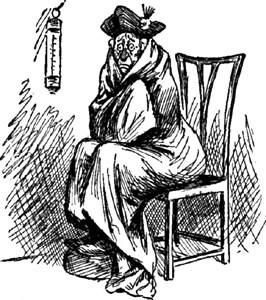
LORD HOWE FELT THE COLD VERY KEENLY.
An expedition to Canada was fitted out the same winter, and an attack made on Quebec, in which General Montgomery was killed and Benedict Arnold showed that he was a brave soldier, no matter how the historian may have hopped on him afterwards.
The Americans should not have tried to take Canada. Canada was, as Henry Clay once said, a persimmon a trifle too high for the American pole, and it is the belief of the historian, whose tears have often wet the pages of this record, that in the future Canada will be what America is now, a free country with a national debt of her own, a flag of her own, an executive of her own, and a regular annual crisis of her own, like other nations.
In 1776 Boston was evacuated. Washington, in order to ascertain whether Lord Howe had a call to fish, cut bait, or go ashore, began to fortify Dorchester Heights, March 17, and on the following morning he was not a little surprised to note the change. As the weather was raw, and he had been in-doors a good deal during the winter, Lord Howe felt the cold very keenly. He went to the window and looked at the Americans, but he would come back chilly and ill-tempered to the fire each time. Finally he hitched up and went away to Halifax, where he had acquaintances.
On June 28 an attack was made by the English on Fort Moultrie. It was built of palmetto logs, which are said to be the best thing in the world to shoot into if one wishes to recover the balls and use them again. Palmetto logs accept and retain balls for many years, and are therefore good for forts.
When the fleet got close enough to the fort so that the brave Charlestonians could see the expression on the admiral's face, they turned loose with everything they had, grape, canister, solid shot, chain-shot, bar-shot, stove-lids, muffin-irons, newspaper cuts, etc., etc., so that the decks were swept of every living thing except the admiral.
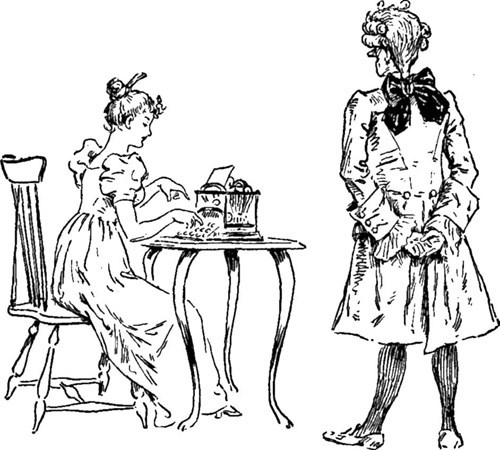
JEFFERSON DICTATING THE DECLARATION OF INDEPENDENCE.
General Clinton by land tried to draw the attention of the rear gunners of the fort, but he was a poor draughtsman, and so retired, and both the land and naval forces quit Charleston and went to New York, where board was not so high.

FAC-SIMILE OF DICTATION.

RINGING THE LIBERTY BELL.
July 4 was deemed a good time to write a Declaration of Independence and have it read in the grove.
Richard Henry Lee, of Virginia, moved that "the United Colonies are, and of right ought to be, free and Independent states." John Adams, of Massachusetts, seconded the resolution. This was passed July 2, and the report of the committee appointed to draw up a Declaration of Independence was adopted July 4.
The Declaration was dictated by Thomas Jefferson, who wrote the most melodious English of any American of his time.
Jefferson had a vocabulary next to Noah Webster, with all the dramatic power of Dan. He composed the piece one evening after his other work. We give a facsimile of the opening lines.
Philadelphia was a scene of great excitement. The streets were thronged, and people sat down on the nice clean door-steps with perfect recklessness, although the steps had just been cleaned with ammonia and wiped off with a chamois-skin. It was a day long to be remembered, and one that made George III. wish that he had reconsidered his birth.
In the steeple of the old State-House was a bell which had fortunately upon it the line "Proclaim liberty throughout all the land unto all the inhabitants thereof." It was rung by the old man in charge, though he had lacked faith up to that moment in Congress. He believed that Congress would not pass the resolution and adopt the Declaration till after election.
Thus was the era of good feeling inaugurated both North and South. There was no North then, no South, no East, no West; just one common country, with Washington acting as father of same. Oh, how nice it must have been!
Washington was one of the sweetest men in the United States. He gave his hand in marriage to a widow woman who had two children and a dark red farm in Virginia.
CHAPTER XVII.
THE BEGINNING OF THE END
The British army now numbered thirty thousand troops, while Washington's entire command was not over seven thousand strong. The Howes, one a general and the other an admiral, now turned their attention to New York. Washington, however, was on the ground beforehand.
Howe's idea was to first capture Brooklyn, so that he could have a place in which to sleep at nights while engaged in taking New York.
The battle was brief. Howe attacked the little army in front, while General Clinton got around by a circuitous route to the rear of the Colonial troops and cut them off. The Americans lost one thousand men by death or capture. The prisoners were confined in the old sugar-house on Liberty Street, where they suffered the most miserable and indescribable deaths.
The army of the Americans fortunately escaped by Fulton Ferry in a fog, otherwise it would have been obliterated. Washington now fortified Harlem Heights, and later withdrew to White Plains. Afterwards he retired to a fortified camp called North Castle.
Howe feared to attack him there, and so sent the Hessians, who captured Fort Washington, November 16.
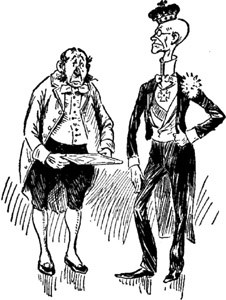
NYE AS THE DUKE OF SANDY BOTTOM.
It looked scaly for the Americans, as Motley says, and Philadelphia bade fair to join New York and other cities held by the British. The English van could be seen from the Colonial rear column. The American troops were almost barefooted, and left their blood-stained tracks on the frozen road.
It was at this time that Washington crossed the Delaware and thereby found himself on the other side; while Howe decided to remain, as the river was freezing, and when the ice got strong enough, cross over and kill the Americans at his leisure. Had he followed the Colonial army, it is quite sure now that the English would have conquered, and the author would have been the Duke of Sandy Bottom, instead of a plain American citizen, unknown, unhonored, and unsung.
Washington decided that he must strike a daring blow while his troops had any hope or vitality left; and so on Christmas night, after crossing the Delaware as shown elsewhere, he fell on the Hessians at Trenton in the midst of their festivities, captured one thousand prisoners, and slew the leader.
The Hessians were having a symposium at the time, and though the commander received an important note of warning during the Christmas dinner, he thrust it into his pocket and bade joy be unconfined.
When daylight came, the Hessians were mostly moving in alcoholic circles trying to find their guns. Washington lost only four men, and two of those were frozen to death.
The result of this fight gave the Colonists courage and taught them at the same time that it would be best to avoid New Jersey symposiums till after the war was over.
Having made such a hit in crossing the Delaware, Washington decided to repeat the performance on the 3d of January. He was attacked at Trenton by Cornwallis, who is known in history for his justly celebrated surrender. He waited till morning, having been repulsed at sundown. Washington left his camp-fires burning, surrounded the British, captured two hundred prisoners, and got away to Morristown Heights in safety. If the ground had not frozen, General Washington could not have moved his forty cannon; but, fortunately, the thermometer was again on his side, and he never lost a gun.
September 11 the English got into the Chesapeake, and Washington announced in the papers that he would now fight the battle of the Brandywine, which he did.
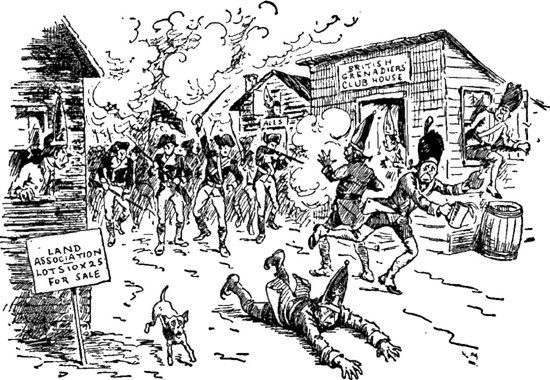
THE COLONIAL SURPRISE-PARTY AT TRENTON.
Marie Jean Paul Roch Yves Gilbert Motier, Marquis de La Fayette, fought bravely with the Americans in this battle, twice having his name shot from under him.
The patriots were routed, scoring a goose-egg and losing Philadelphia.
October 4, Washington attacked the enemy at Germantown, and was beaten back just as victory was arranging to perch on his banner. Poor Washington now retired to Valley Forge, where he put in about the dullest winter of his life.
The English had not been so successful in the North. At first the Americans could only delay Burgoyne by felling trees in the path of his eight thousand men, which is a very unsatisfactory sort of warfare, but at last Schuyler, who had borne the burden and heat of the day, was succeeded by Gates, and good luck seemed to come slowly his way.
A foolish boy with bullet-holes cut in his clothes ran into St. Leger's troops, and out of breath told them to turn back or they would fill a drunkard's grave. Officers asked him about the numbers of the enemy, and he pointed to the leaves of the trees, shrieked, and ran for his life. He ran several days, and was barely able to keep ahead of St. Leger's troops by a neck.
Burgoyne at another time sent a detachment under Colonel Baum to take the stores at Bennington, Vermont. He was met by General Stark and the militia. Stark said, "Here come the redcoats, and we must beat them to-day, or Molly Stark is a widow." This neat little remark made an instantaneous hit, and when they counted up their string of prisoners at night they found they had six hundred souls and a Hessian.
Burgoyne now felt blue and unhappy. Besides, his troops were covered with wood-ticks and had had no washing done for three weeks.
He moved southward and attacked Gates at Bemis Heights, or, as a British wit had it, "gave Gates ajar," near Saratoga. A wavering fight occupied the day, and then both armies turned in and fortified for two weeks. Burgoyne saw that he was running out of food, and so was first to open fire.
Arnold, who had been deprived of his command since the last battle, probably to prevent his wiping out the entire enemy and getting promoted, was so maddened by the conflict that he dashed in before Gates could put him in the guard-house, and at the head of his old command, and without authority or hat, led the attack. Gates did not dare to come where Arnold was, to order him back, for it was a very warm place where Arnold was at the time. The enemy was thus driven to camp.
Arnold was shot in the same leg that was wounded at Quebec; so he was borne back to the extreme rear, where he found Gates eating a doughnut and speaking disrespectfully of Arnold.
A council was now held in Burgoyne's tent, and on the question of renewing the fight stood six to six, when an eighteen-pound hot shot went through the tent, knocking a stylographic pen out of General Burgoyne's hand. Almost at once he decided to surrender, and the entire army of six thousand men was surrendered, together with arms, portable bath-tubs, and leather hat-boxes. The Americans marched into their camp to the tune of Yankee Doodle, which is one of the most impudent compositions ever composed.
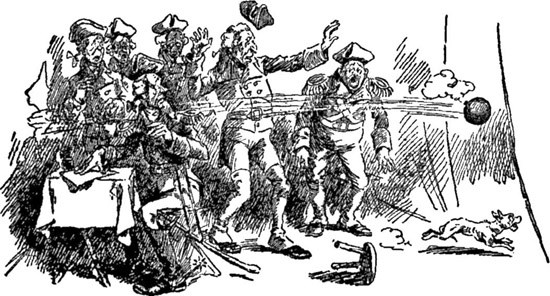
KNOCKING A STYLOGRAPHIC PEN OUT OF BURGOYNE'S HAND.
During the Valley Forge winter (1777-78) Continental currency depreciated in value so that an officer's pay would not buy his clothes. Many, having also spent their private funds for the prosecution of the war, were obliged to resign and hire out in the lumber woods in order to get food for their families. Troops had no blankets, and straw was not to be had. It was extremely sad; but there was no wavering. Officers were approached by the enemy with from one hundred to one thousand pounds if they would accept and use their influence to effect a reconciliation; but, with blazing eye and unfaltering attitude, each stated that he was not for sale, and returned to his frozen mud-hole to rest and dream of food and freedom.
Those were the untitled nobility from whom we sprung. Let us look over our personal record and see if we are living lives that are worthy of such heroic sires.
Five minutes will now be given the reader to make a careful examination of his personal record.
* * * * * ** * * * * *In the spring the joyful news came across the sea that, through the efforts of Benjamin Franklin, France had acknowledged the independence of the United States, and a fleet was on the way to assist the struggling troops.
The battle of Monmouth occurred June 28. Clinton succeeded Howe, and, alarmed by the news of the French fleet, the government ordered Clinton to concentrate his troops near New York, where there were better facilities for getting home.
Washington followed the enemy across New Jersey, overtaking them at Monmouth. Lee was in command, and got his men tangled in a swamp where the mosquitoes were quite plenty, and, losing courage, ordered a retreat.
Washington arrived at that moment, and bitterly upbraided Lee. He used the Flanders method of upbraiding, it is said, and Lee could not stand it. He started towards the enemy in preference to being there with Washington, who was still rebuking him. The fight was renewed, and all day long they fought. When night came, Clinton took his troops with him and went away where they could be by themselves.
An effort was made to get up a fight between the French fleet and the English at Newport for the championship, but a severe storm came up and prevented it.
In July the Wyoming Massacre, under the management of the Tories and Indians, commanded by Butler, took place in that beautiful valley near Wilkes Barre, Pennsylvania.
This massacre did more to make the Indians and Tories unpopular in this country than any other act of the war. The men were away in the army, and the women, children, and old men alone were left to the vengeance of the two varieties of savage. The Indians had never had gospel privileges, but the Tories had. Otherwise they resembled each other.
In 1779 the English seemed to have Georgia and the South pretty well to themselves. Prevost, the English general, made an attack on Charleston, but, learning that Lincoln was after him, decided that, as he had a telegram to meet a personal friend at Savannah, he would go there. In September, Lincoln, assisted by the French under D'Estaing, attacked Savannah. One thousand lives were lost, and D'Estaing showed the white feather to advantage. Count Pulaski lost his life in this fight. He was a brave Polish patriot, and his body was buried in the Savannah River.
The capture of Stony Point about this time by "Mad Anthony Wayne" was one of the most brilliant battles of the war.
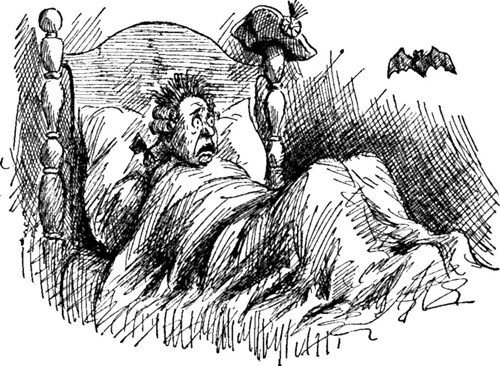
THE ONLY THING WAYNE WAS AFRAID OF.
Learning the countersign from a negro who sold strawberries to the British, the troops passed the guard over the bridge that covered the marsh, and, gagging the worthy inside guard, they marched up the hill with fixed bayonets and fixed the enemy to the number of six hundred.
The countersign was, "The fort is won," and so it was, in less time than it takes to ejaculate the word "scat!" Wayne was wounded at the outset, but was carried up the hill in command, with a bandage tied about his head. He was a brave man, and never knew in battle what fear was. Yet, strange to say, a bat in his bed would make him start up and turn pale.
CHAPTER XVIII.
THE CLOSE OF THE REVOLUTION
The atrocities introduced into this country by the Tories and Indians caused General Sullivan to go out against the measly enemy, whip him near Elmira, and destroy the fields of corn and villages in the Genesee country, where the Indian women were engaged in farming while their men-folks attended to the massacre industry.
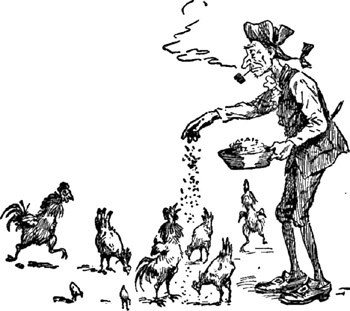
GENERAL GATES'S PROPER CAREER.
The weak point with the Americans seemed to be lack of a suitable navy. A navy costs money, and the Colonists were poor. In 1775 they fitted out several swift sailing-vessels, which did good service. Inside of five years they captured over five hundred ships, cruised among the British isles, and it is reported that they captured war-vessels that were tied to the English wharves.
Paul Jones had a method of running his vessel alongside the enemy's, lashing the two together, and then having it out with the crew, generally winning in a canter. His idea in lashing the two ships together was to have one good ship to ride home on. Generally it was the one he captured, while his own, which was rotten, was allowed to go down. This was especially the case in the fight between the Richard and the Serapis, September 23, 1779.
In 1780 the war was renewed in South Carolina. Charleston, after a forty days' siege, was forced to surrender. Gates now took charge of the South, and also gave a sprinting exhibition at Camden, where he was almost wiped off the face of the earth. He had only two troops left at the close of the battle, and they could not keep up with Gates in the retreat. This battle and the retreat overheated Gates and sowed the seeds of heart-disease, from which he never recovered. He should have chosen a more peaceful life, such as the hen-traffic, or the growth of asparagus for the market.
Benedict Arnold has been severely reproached in history, but he was a brave soldier, and possibly serving under Gates, who jealously kept him in the background, had a good deal to do with the little European dicker which so darkened his brilliant career as a soldier.
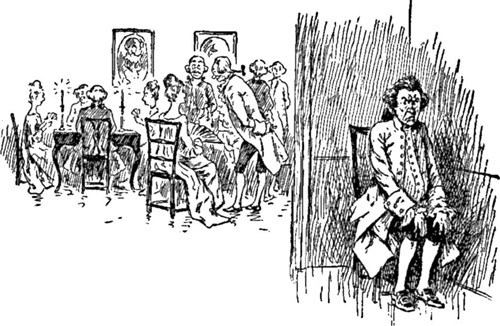
ARNOLD'S RECEPTION IN ENGLAND.
Unhappy man! He was not well received in England, and, though a brilliant man, was forced to sit in a corner evening after evening and hear the English tell his humorous stories as their own.
The Carolinas were full of Tories, and opposition to English rule was practically abandoned in the South for the time, with the exception of that made in a desultory swamp-warfare by the partisan bands with such leaders as Marion, Sumter, and Pickens.
Two hundred thousand dollars of Continental money was the sum now out. Forty dollars of it would buy one dollar's worth of groceries; but the grocer had to know the customer pretty well, and even then it was more to accommodate than anything else that he sold at that price.
The British flooded the country with a counterfeit that was rather better-looking than the genuine: so that by the time a man had paid six hundred dollars for a pair of boots, and the crooked bills had been picked out and others substituted, it made him feel that starting a republic was a mighty unpopular job.

